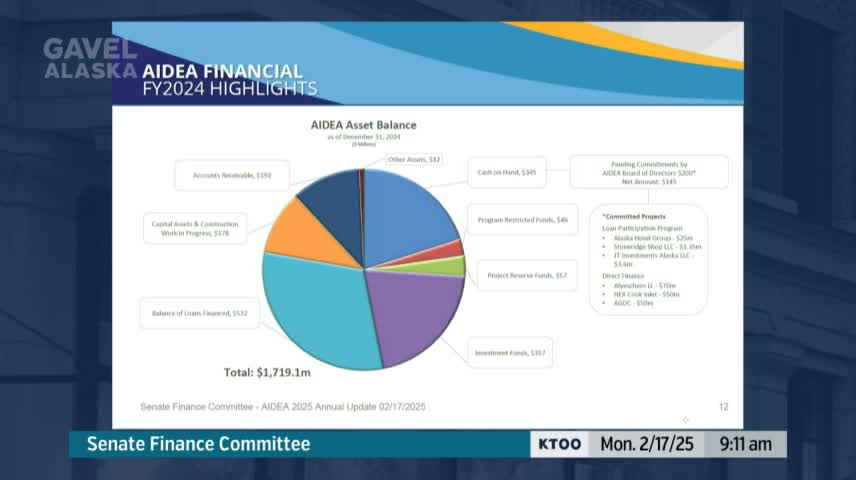Senators press ADA over plan to backstop up to $50 million in FEED work for proposed gas pipeline
Get AI-powered insights, summaries, and transcripts
Subscribe
Summary
At a Feb. 17 hearing in Juneau, the Alaska Senate Finance Committee pressed the Alaska Industrial Development and Export Authority about a proposal that could expose ADA to up to $50 million to backstop FEED work for a proposed in‑state gas pipeline.
Juneau — Members of the Alaska Senate Finance Committee probed the Alaska Industrial Development and Export Authority’s plan to provide a corporate guarantee that could expose ADA to as much as $50 million to backstop front-end engineering and design (FEED) work for a proposed in‑state gas pipeline during a Feb. 17 committee hearing.
The committee’s most pointed questions centered on two issues: whether ADA has the statutory authority to commit funds or guarantees without a legislative appropriation and how the agency will limit and recover its financial risk if the project does not reach a final investment decision (FID). “I do feel we have the legislative authority to expend those funds given our statutes,” ADA Executive Director Randy Veraro told the committee, adding that ADA distinguishes its earnings and statutory funds from State general funds.
Why it matters: the proposal would make ADA a financial backstop for FEED work on the pipeline’s first phase (the proposed in‑state transmission line) — a phase several senators described as the riskiest element of the overall project. Committee members said $50 million is a substantial exposure for ADA and urged clearer public disclosure of contractual terms and any recovery mechanisms.
What ADA told the committee
- Structure and limits: Veraro described the proposed commitment as a corporate guarantee limited to actual FEED costs incurred. Under ADA’s description, funds would remain in ADA’s accounts and ADA would only be obligated to pay amounts tied to completed work if the project does not proceed to FID. “We’re tied to paying for only the work that was done and completed,” Veraro said.
- Conditional obligation: ADA officials told senators the guarantee would be conditional — ADA would not make any payment unless a developer decided not to take final investment decision. Veraro said the engineering firm and developer would pay work costs as the FEED is performed and that ADA’s exposure would be limited to the sum of completed FEED work that was not reimbursed by the developer.
- Compensation and recovery: ADA said it is negotiating compensation tied to pipeline volumes if the project advances and is also seeking collateral arrangements that would allow ADA to recover costs if the FEED work is paid for but the project does not proceed.
Senators’ concerns and requests
- Appropriations authority: Several senators — including Chairman Stedman and others on the panel — emphasized the Legislature’s constitutional role as appropriator and asked for legal clarity about ADA’s authority to commit ADA‑managed funds or earnings without a statutory appropriation. Senator Stedman said the committee needs to “dig into this further because we are the appropriating authority.”
- Transparency under NDA: Veraro said some negotiation details remain under non‑disclosure agreements and he must consult counsel about what can be shared with the Legislature before the agreement is finished. Senators pressed for enough disclosure to evaluate the risk to Alaskans.
- Matching funds and “skin in the game”: Multiple senators urged that the developer carry meaningful matching exposure. “If we go down this road, we just look at that as a sunk cost,” Senator Stedman said, arguing the state should require shared risk rather than bearing the entire loss if phase 1 fails.
- Risk concentration in phase 1: Senators repeatedly flagged phase 1 (the pipeline) as carrying the most construction and escalation risk, while acknowledging other project components (liquefaction, conditioning) may be modularized and built elsewhere.
Developer, supply and federal context (as described to the committee)
ADA and committee discussion referenced a number of external factors said to affect project risk and financing: public reporting by project proponents, the role of the federal government in providing loan guarantees, and reported interest from foreign investors. Veraro told the committee he believes the current federal administration’s trade and investment posture makes this moment different from past pipeline efforts.
On supply, ADA noted public filings described a producer (identified in testimony as “Great Bear”) that has filed for gas sales to AGDC of up to 500,000,000 cubic feet per day at a maximum price of $1 per unit (as stated in the presentation). Those claims were presented to the committee as material to project economics but not independently verified in the hearing.
What the committee asked for next
Senators asked ADA to provide follow‑up information in writing, including legal analysis about appropriation authority, further detail on the guarantee terms and collateral or recovery mechanisms, and the timeline for when the Legislature might see contract language suitable for review. ADA said it will consult counsel on what can be shared where NDA provisions exist.
Distinguishing discussion from decision
The hearing produced questions and direction to staff to return with more information. The committee did not take any formal vote or adopt a legislative action during the session; senators requested additional documentation and legal analysis before considering any appropriation or other action.
What remains unresolved
Key elements remain under negotiation or in NDA review, including the detailed tolling/compensation structure ADA would use to recover its outlays if the project advances, and specific collateral arrangements ADA said it is pursuing. Senators asked that ADA seek terms that reduce the chance the developer can spend extensively on FEED before the developer bears meaningful exposure.
Committee context and next steps
Multiple senators said they support the overall objective of bringing new jobs and gas supply to parts of Alaska but want stronger public safeguards and clearer documentation before ADA assumes potential losses. The committee will expect written follow‑up from ADA and counsel on authority and terms before pursuing any legislative appropriation or further action related to the proposed ADA guarantee.
